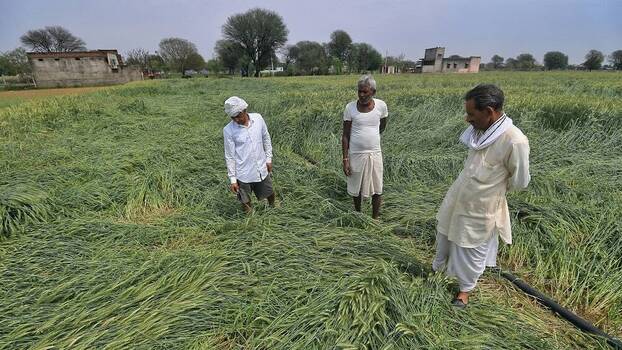
The Intergovernmental Panel on Climate Change (IPCC) just released its synthesis report, a compilation of the main findings of six larger bodies of scientific work, authored by thousands of scientists in an exhaustive process over the past decade. Each report contains a summary section, agreed upon word-for-word by the authors and various state representatives in often-heated discussions. While the selection of authors still leaves room for improvement in terms of diversity, the IPCC constitutes by far the most prestigious body on climate change science, and their reports are a crucial guide for action.
David Williams directs the Rosa Luxemburg Foundation’s Climate Justice Programme in New York.
Once again, the findings are dire. Projections indicate the 1.5°C warming limit will be reached within ten years, failing binding commitments made in the Paris Agreement in 2015. To prevent further warming and with it the deterioration of living conditions for future generations, it is imperative to drastically reduce the burning of fossil fuels.
As a result of “historical and ongoing patterns of inequity such as colonialism”, over 3 billion people already live in vulnerability today, where the likelihood of deaths from storms, floods, droughts, and other climate change-induced extreme events is 15 times higher than in safer living conditions. Moreover, the frequency and intensity of climate change-induced extreme events is rising faster than previously anticipated, and will continue to increase with every decimal point of warming. This enhances the potential for cascading and compounding risks, whereby several extreme events occur and converge at the same time, leading to increased rates of migration and displacement but also more suffering for those who cannot leave their homes.
Media outlets are hailing the synthesis report as yet another final warning, as a desperate call to act now before it’s too late. It is fundamental to recognize, however, that this will only be achieved if those causing the climate crisis are held to account.
The report identifies growing inequality as a driver of vulnerability, but inequality in terms of carbon emissions has also risen over the past decades. Recent figures show that the top 10 percent of income and wealth holders are responsible for 48 percent of global emissions, while the bottom 50 percent are responsible for a mere 12 percent. In terms of regional distribution, there is a stark divide between industrialized and low-income countries’ emissions.
The latest IPCC report is indeed a final warning, but more than anything, it is a final appeal for concerted and meaningful action against those who are responsible for the climate crisis.
Despite the “polluter pays” principle being enshrined in the Paris Agreement, industrialized countries have not come even close to meeting their commitment of 100 billion US dollars for climate finance every year (an insufficient target to begin with). Given the dearth of climate finance to assist low-income countries deal with the climate crisis, it’s perhaps no surprise that inequality is accelerating both within and between countries.
The question of debt is also increasingly coming into focus. The report identifies indebtedness in low-income countries as a key barrier to effective climate action. Historical debt is a significant burden that severely restricts fiscal flexibility in responding to emergencies caused by the climate crisis, for which the inhabitants of those countries hold almost no responsibility. Calls are therefore growing from civil society organizations and politicians to reform international financial institutions such as the World Bank and the International Monetary Fund in a way that would facilitate wholesale debt restructuring and cancellations in line with climate justice.
As far as slowing global warming is concerned, reducing global carbon emissions is the most urgent priority. The report finds that finance flows for fossil fuels from both public and private sources are greater than for adaptation and mitigation. Yet, the authors neglect to explore possibilities for transforming the global financial system in a way that makes those responsible actually foot the bill for their carbon emissions.
A recent report on climate change and inequality shows how climate finance is inherently linked to national tax capacity. Progressive taxes on wealth, income, and large inheritances would constitute effective mechanisms to reallocate finance to those most impacted by climate change. Taxes aimed specifically at highly polluting sectors of the economy such as aviation, shipping, the automotive industry, or Big Tech could also be beneficial. Introducing efficient international legislation to stop the operation of tax havens as well as improving countries’ taxation rights over the profits of multinational corporations would be highly effective.
The report’s findings imply quite clearly that the polluter pays principle should be extended to private companies reaping the rewards of the climate crisis. The five big oil companies’ combined profits of 200 trillion dollars is an insult to the people and communities across the world impacted by the climate crisis, and underlines the need for an immediate discontinuation of fossil fuel subsidies which, according to the report, would also have benefits such as improved public revenue and macroeconomic performance.
Although there have not been many rulings in favour of the plaintiffs in climate justice litigation so far, advances in attribution science linking climate change-induced extreme events to emitting entities, and the more effective utilization of those findings in court cases, may lead to increased successes for climate justice advocates.
It will be nearly a decade before the Intergovernmental Panel on Climate Change publishes its next report. What that report says will be determined by whether our side succeeds in shifting the current balance of forces, in which fossil fuel companies remain dominant. The latest IPCC report is indeed a final warning, but more than anything, it is a final appeal for concerted and meaningful action against those who are responsible for the climate crisis. The solutions presented here may not be exhaustive, but would certainly make for a good starting point.